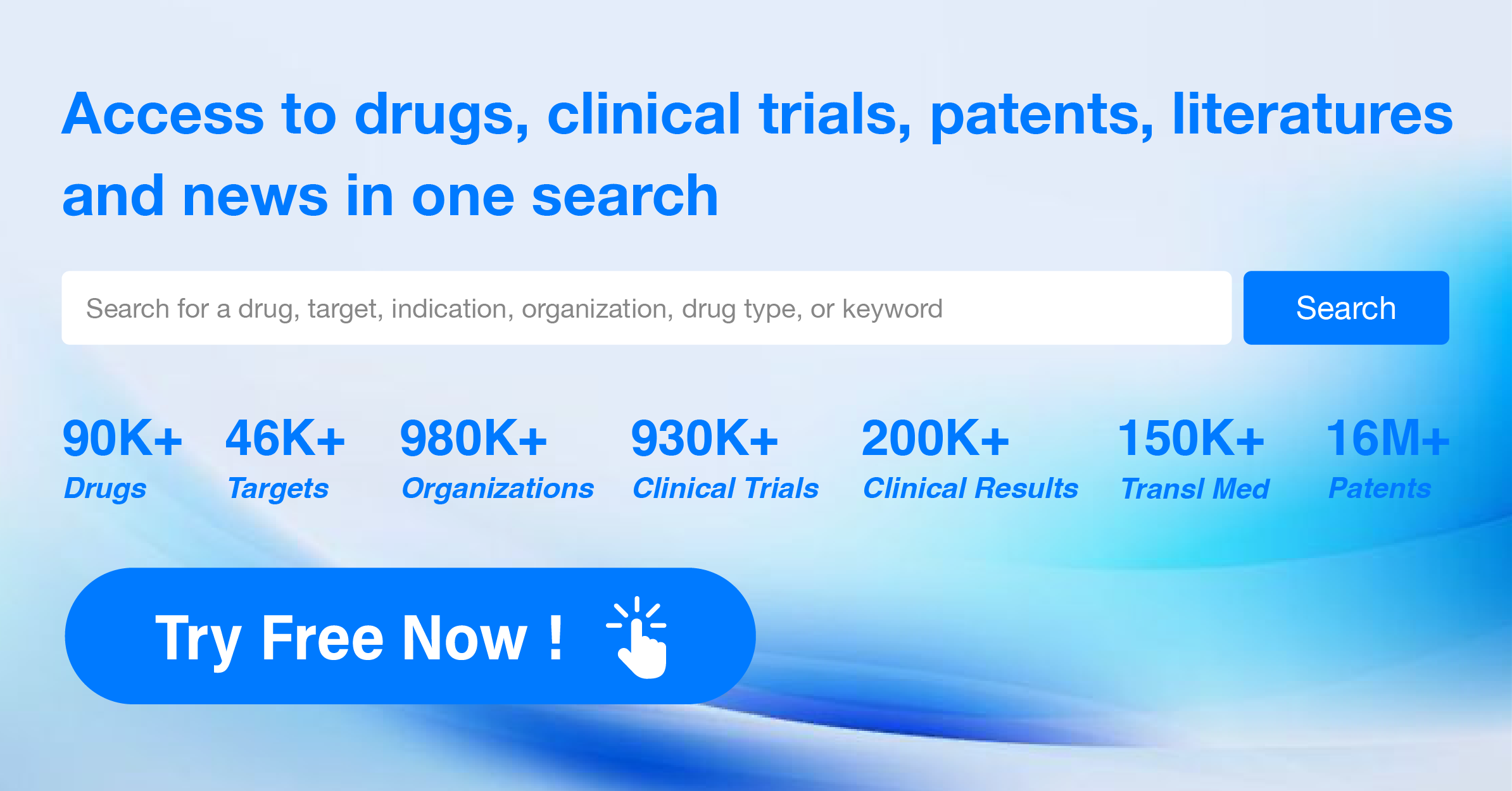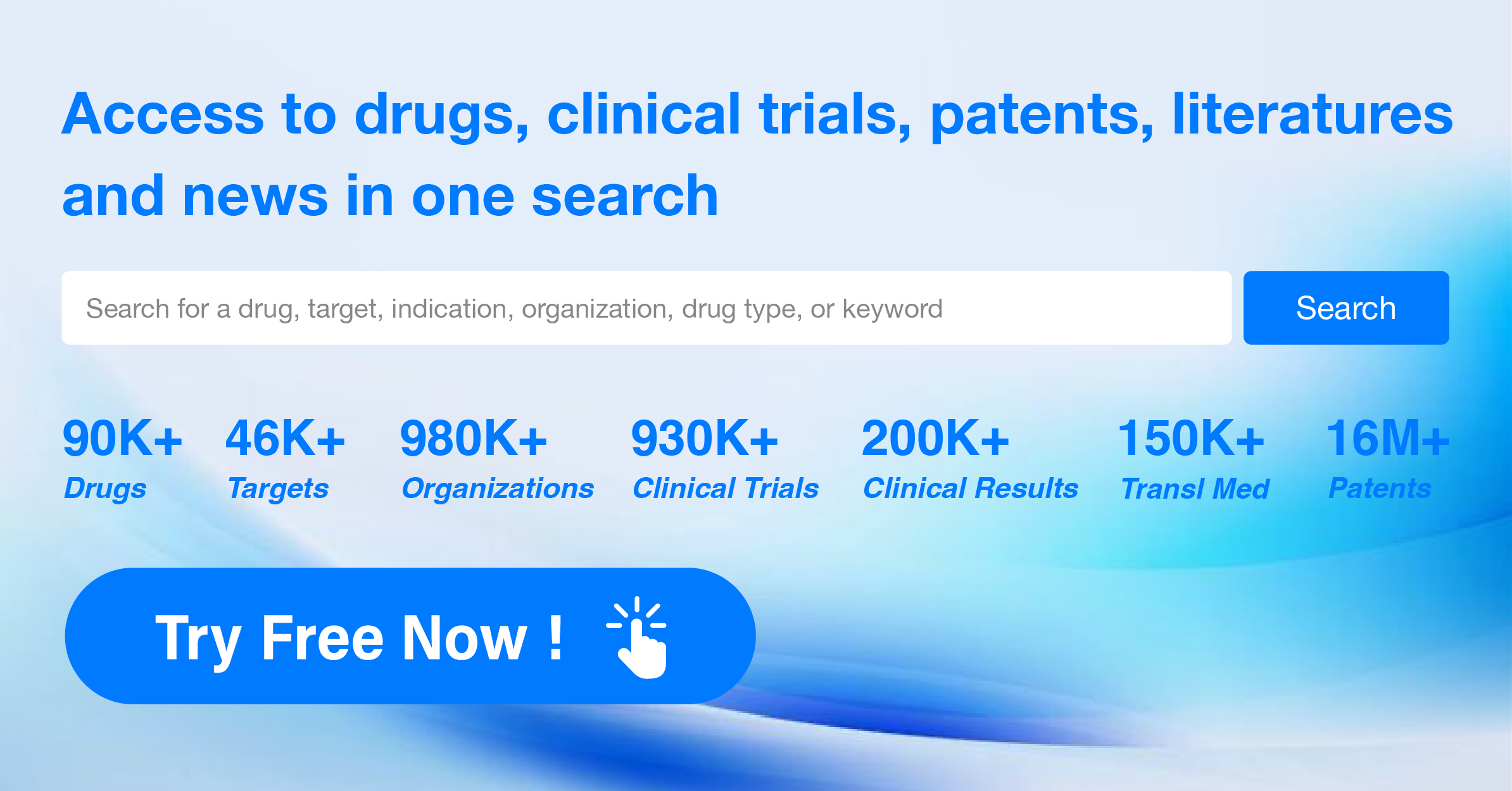Global New Drug Research and Development Progress Weekly Report(7.1-7.7)
Global Pharmaceutical Research and Development Progress
1.TauRx Pharmaceuticals Announces Submission for Marketing Authorization of Oral Tau Protein Targeting Therapy HMTM for Alzheimer's Disease
On July 1st, TauRx Pharmaceuticals announced the submission of a Marketing Authorization Application (MAA) in the UK for the tau aggregation inhibitor Hydromethylthionine Mesylate (HMTM), intended for the treatment of mild cognitive impairment (MCI-AD) and mild to moderate dementia caused by Alzheimer's disease. HMTM has the potential to become the first oral anti-tau protein therapy for the treatment of Alzheimer's disease. This application is based on recently published data from the 24-month Phase III LUCIDITY clinical trial and comprehensive data from two other Phase III studies targeting early mild to moderate AD. The studies consistently demonstrated that HMTM benefits patients in terms of slowing cognitive decline, maintaining normal daily living abilities, and reducing brain atrophy rates.
The LUCIDITY trial compared the cognitive and functional outcomes, as well as changes in brain volume loss, of patients with early to moderate AD receiving daily treatment of 16mg HMTM against a control group over 12 months. The trial then entered an open-label phase where each patient continued daily treatment with HMTM for the following 12 months. Recent results indicate that patients in the HMTM treatment group showed significant improvements over baseline at 18 months and returned to baseline values after 24 months. Compared to the control group, there was a significant reduction in the progression of symptoms to the dementia stage among patients treated with HMTH.
2.Neurocrine Biosciences files for approval of new CRF1 antagonist drug for the treatment of rare endocrine disorders
On July 1st, Neurocrine Biosciences announced that the FDA has accepted two New Drug Applications (NDAs) for Crinecerfont, granting them Priority Review status, for the treatment of children, adolescents, and adults with classic Congenital Adrenal Hyperplasia (CAH). If approved, Crinecerfont would be the first new treatment option for CAH in 70 years, offering a novel approach for managing this rare and severe endocrine disorder. The two NDAs submitted by Neurocrine Biosciences for Crinecerfont include its use in (1) capsule formulation (NDA#218808) and (2) oral solution formulation (NDA#218820) to assess the efficacy and safety in treating classic CAH. Previously, Crinecerfont was designated as an orphan drug in March 2019 and received Breakthrough Therapy designation in December 2023. Study data for Crinecerfont has indicated that reducing adrenal androgens can lower the physiological dosage of glucocorticoids required to control excess androgens, thereby potentially reducing the risks associated with exposure to higher-than-normal doses of glucocorticoids in CAH patients.
3.Eli Lilly's long-acting RNAi therapy commences Phase 3 clinical trials in China for cardiovascular diseases
Eli Lilly and Company has launched a Phase 3 clinical trial for lepodisiran (LY3819469), an international multicenter study including centers in China, as indicated by the latest updates in the Chinese Clinical Trial Registry. The trial aims to assess the efficacy of lepodisiran in reducing the risk of major adverse cardiovascular events (MACE) in adult patients who have been diagnosed with atherosclerotic cardiovascular disease (ASCVD) with elevated lipoprotein(a) [Lp(a)] levels, or those at an increased risk of a first cardiovascular event. Lepodisiran, a targeted small interfering RNA (siRNA) therapy, works by disrupting the mRNA in the liver that produces apolipoprotein(a), thereby reducing the production of Lp(a). It is being studied for the treatment of ASCVD.
In November 2023, Eli Lilly presented the initial human study results of lepodisiran at the American Heart Association Scientific Sessions. The principal findings indicated that under the highest dosage (608mg) of lepodisiran, Lp(a) levels rapidly decreased, becoming undetectable by day 29, and remained undetectable through day 281, with a slight increase thereafter. By week 48, the median reduction in Lp(a) levels was 94%, with a peak median change of 97%. These results suggest that a single injection of lepodisiran can reduce Lp(a) levels to undetectable levels for nearly a year.
4.Hengrui's Liposomal Bupivacaine Injection Receives FDA Approval for Market Release
On July 2, Hengrui Medicine announced that the FDA has approved its liposomal bupivacaine injection for market release in the United States, in two specifications: 133mg/10mL and 266mg/20mL. Hengrui has become the first manufacturer to receive FDA approval for a generic version of this product in the U.S. Bupivacaine is an amide-type local anesthetic widely used for local anesthesia and postoperative pain management. Compared to the typical 5 to 6 hours duration of action provided by standard injections, the liposomal bupivacaine injection can extend pain relief for several days. It utilizes an advanced multivesicular liposomal drug delivery system, which offers effective sustained release, benefiting the management of post-surgical pain and thereby enhancing the quality of life for patients. The liposomal bupivacaine injection was originally developed by the American company Pacira, commercially named Exparel, and was approved in the U.S. in 2011. Currently, it is sold only in the United States and Europe. Due to its high technical barriers, no generic versions have been successfully marketed in over a decade since its release.
5.Sanofi and Regeneron's Dupilumab Approved in the EU for COPD Indication
On July 3, Sanofi and Regeneron jointly announced that dupilumab, marketed as Dupixent, has been approved by the European Medicines Agency (EMA) as an add-on maintenance treatment for patients with Chronic Obstructive Pulmonary Disease (COPD) characterized by elevated levels of blood eosinophils and uncontrolled symptoms. This approval includes patients already being treated with a combination of inhaled corticosteroids (ICS), long-acting β2 agonists (LABA), and long-acting muscarinic antagonists (LAMA). The favorable outcomes from the BOREAS and NOTUS studies were the primary basis for this approval.
The BOREAS study (n=939) results demonstrated that patients in the dupilumab group experienced a 30% reduction in the frequency of moderate-to-severe COPD exacerbations over 52 weeks (0.78 vs. 1.10, p<0.001). Additionally, by week 12, dupilumab-treated patients showed an increase in forced expiratory volume in one second (FEV1) of 160 mL from baseline, compared to a 77 mL increase in the placebo group (least squares mean difference of 83 mL, p<0.001).
Similarly, the NOTUS study (n=935) results showed a 34% reduction in the frequency of moderate-to-severe COPD exacerbations among dupilumab-treated patients over 52 weeks (0.86 vs. 1.30, p<0.001). Furthermore, at week 12, the dupilumab group demonstrated a FEV1 increase of 139 mL from baseline, compared to an increase of 57 mL in the placebo group (least squares mean difference of 82 mL, p<0.001).
6.Vertex Pharmaceuticals Announces Acceptance of Marketing Authorization Applications for New Triple Combination Therapy by FDA and EMA
On July 3rd, Vertex Pharmaceuticals announced that the U.S. Food and Drug Administration (FDA) has accepted its New Drug Application (NDA) for the once-daily vanzacaftor/tezacaftor/deutivacaftor triple combination therapy (vanza triple therapy) for treating cystic fibrosis (CF) patients aged 6 and above, who have at least one F508del mutation or another responsive mutation in the cystic fibrosis transmembrane conductance regulator (CFTR) gene. Patients with these mutations have shown a response to vanza triple therapy. Vertex has utilized a priority review voucher, with a Prescription Drug User Fee Act (PDUFA) target date set for January 2, 2025. Additionally, the European Medicines Agency (EMA) has completed its validation of the Marketing Authorization Application (MAA) for this therapy for those aged 6 and above with CF submitted by Vertex in the European Union. The company has also filed regulatory submissions in Canada, Australia, Switzerland, and the United Kingdom. Analysis indicates that vanza triple therapy achieved positive outcomes in three Phase 3 clinical trials. The results showed that, after 24 weeks of treatment, the efficacy of vanza triple therapy was comparable to that of the active control drug based on assessments using ppFEV1 values, meeting the primary endpoint of the studies. The results further demonstrated that vanza triple therapy showed superiority in reducing SwCl levels in the first key secondary endpoint in the SKYLINE 102 and SKYLINE 103 trials.
7.Extension of Overall Survival in Cancer! Johnson & Johnson/Legend Biotech Announce Positive Phase 3 CAR-T Therapy Results
On July 3rd, Johnson & Johnson, together with Legend Biotech, announced the positive results from the planned second interim analysis of the Phase 3 CARTITUDE-4 study. This study evaluated their jointly developed chimeric antigen receptor (CAR) T-cell therapy, Carvykti (ciltacabtagene autoleucel, cilta-cel), in comparison with standard therapies for patients with relapsed or refractory multiple myeloma (MM) who are lenalidomide-resistant after frontline therapy. The interim analysis demonstrated statistically significant and clinically meaningful improvements in overall survival (OS) for patients treated with Carvykti compared to those receiving standard therapies. Detailed data will be presented at upcoming medical conferences and submitted to global regulatory authorities. Previous results from the trial indicated that, according to the Independent Review Committee (IRC), Carvykti-treated patients in the CARTITUDE-4 trial exhibited a statistically significant improvement in progression-free survival (PFS) compared to the standard therapy group (HR = 0.41, 95% CI: 0.30-0.56, p < 0.0001).
8.Gan & Lee Pharmaceuticals Announces Clinical Data of GLP-1RA Biweekly Formulation
On July 4th, Gan & Lee Pharmaceuticals announced the initial results of the Phase 1b/2a clinical study of GZR18 injection at the 84th Scientific Sessions of the American Diabetes Association (ADA) in 2024. The study, which treated participants for 35 weeks, demonstrated that this innovative GLP-1 receptor agonist reduced the body weight of obese subjects by 18.6%. The results indicate that GZR18 injection could significantly decrease body weight in obese Chinese participants, administered either weekly or biweekly, and improvements were observed in Body Mass Index (BMI), waist circumference, and other cardiometabolic risk factors. The safety and tolerability were well maintained, laying a solid foundation for further development in overweight or obese populations. GLP-1 receptor agonists (GLP-1RAs) are widely used clinically for weight management due to their significant weight reduction effects. In preclinical studies, GZR18 injection showed potential for weekly administration and significantly lowered animal body weights. The latest Phase 1b/2a clinical trial results presented at the ADA meeting further assessed the efficacy and safety of GZR18 injection in obese adults in China. Key findings revealed an average weight reduction of 17.8% with weekly (QW) and 12.8% with biweekly (Q2W) administration over 35 weeks in obese Chinese participants, representing a reduction of 18.6% and 13.5% respectively, compared to a placebo group that gained 0.7% in weight. GZR18 improved the overall metabolic status of participants and exhibited good safety and tolerability in obese subjects.
9.Johnson & Johnson's new bispecific antibody cancer drug talquetamab has been approved for marketing in South Korea
Recently, Johnson & Johnson Korea announced that its bispecific antibody drug, talquetamab, has been approved for marketing in South Korea. The drug is indicated as a monotherapy for adult patients with relapsed or refractory multiple myeloma who have received at least three prior therapies, including a proteasome inhibitor, an immunomodulatory agent, and an anti-CD38 antibody. Talquetamab is an off-the-shelf, subcutaneously administered, "first-in-class" bispecific antibody that targets GPRC5D and CD3. It had previously received accelerated approval from the U.S. FDA in August 2023. Multiple myeloma is often referred to as "cancer of the elderly," with its incidence having increased by more than 60% over the past decade, and many patients experience relapses. In a cohort study, patients with multiple myeloma who received three or more lines of therapy, including an anti-CD38 monoclonal antibody, only achieved an objective response rate (ORR) of 30% or lower, resulting in shortened life expectancy and poor prognosis. Targeting GPRC5D has been shown to provide a deep response and, uniquely, its expression is restricted to immune cells, offering a significant new approach to targeting this heterogeneous disease.
10.Novo Nordisk's long-acting recombinant coagulation factor VIII, Turoctocog Alfa Pegol injection has been approved for marketing in China
On July 5th, Novo Nordisk's Turoctocog Alfa Pegol injection received marketing approval in China. Turoctocog Alfa Pegol is another long-acting recombinant coagulation factor VIII (FVIII) developed by Novo Nordisk based on Turoctocog alfa (injectable recombinant human factor VIII, trade name: Novoeight). It was first approved in the United States in February 2019, under the brand name Esperoct, for prophylactic and acute treatment of adults and children with Hemophilia A. Turoctocog Alfa Pegol is based on Novoeight, with a molecular modification of approximately 40 kDa PEG attached to the B-domain of Turoctocog alfa, nearly doubling its half-life. Typically, patients with Hemophilia A require thrice-weekly infusions of coagulation factors. Turoctocog Alfa Pegol reduces the frequency of injections to once every four days, which can reduce the annual bleeding rate in patients by 96%. Novo Nordisk has several drugs in the hemophilia field, aside from Novoeight and Turoctocog Alfa Pegol mentioned above. Its human IgG4 monoclonal antibody targeting tissue factor pathway inhibitor (TFPI), Concizumab, was approved in Japan in September 2023 for prophylactic treatment of Hemophilia A and B with inhibitors.
For more information on the progress of drug development, please follow the Synapse database.
Dynamics of Global Pharmaceutical Trade Cooperation
1.BMS and Eisai Terminate Global Collaboration on FRα ADC
On July 1, Eisai announced that BMS, due to internal prioritization of its product portfolio, will terminate their global strategic collaboration on the FRα ADC drug MORAb-202. Previously in June 2021, BMS and Eisai jointly announced that they had reached a global development and commercialization collaboration agreement for the ADC drug MORAb-202 (Farletuzumab Ecteribulin). The total value of the transaction was up to $3.1 billion. According to the agreement, Eisai and BMS were to co-develop and commercialize MORAb-202 in regions including Japan, China, Asia-Pacific countries, the United States, Canada, Europe (including the EU and the UK), and Russia. BMS was responsible for the development and commercialization of the drug in regions outside of the collaboration territories, while Eisai continued to handle the global manufacturing and supply of MORAb-202. As per the terms of the agreement, BMS was to pay Eisai $650 million, including $200 million to cover Eisai's research and development costs. Moreover, Eisai was entitled to receive up to $2.45 billion in milestone payments. Both parties were to share profits, research and development, and commercialization costs within the collaborative regions, with Bristol-Myers Squibb paying royalties to Eisai on sales outside those regions. Following the termination of this collaboration, Eisai will proceed independently with the global development and commercialization of MORAb-202, returning a portion of the unused $200 million R&D funds to BMS, and recording the remaining as other income.
2.Merck Exercises Option to Acquire Exclusive Global Rights to CYP11A1 Inhibitors
On July 1st, Merck and Orion Corporation announced that they have exercised their option to transition the joint development and commercialization rights of the CYP11A1 inhibitor, opevesostat (MK-5684/ODM-208), and other investigational CYP11A1 inhibitory compounds, to Merck’s exclusive global licensing rights. According to the terms of the agreement, Orion is eligible to receive up to $30 million in development milestone payments, up to $625 million in regulatory milestone payments, and up to $975 million in sales milestone payments. Additionally, Orion will receive annual tiered royalty fees on net sales of any commercialized product, with rates ranging from the low double digits to the low twenties. MK-5684 is a novel, oral, non-steroid, selective CYP11A1 inhibitor being developed for the treatment of prostate cancer. CYP11A1 catalyzes the first step in steroid biosynthesis and is the rate-limiting enzyme, thus MK-5684 inhibits the production of all androgen receptor (AR) pathway-related steroid hormones and precursors.
3.Eli Lilly Announces Collaboration with Radionetics to Develop GPCR Nuclear Medicine with an Option to Acquire for $1 Billion
On July 1st, Eli Foundation announced its partnership with Radionetics to advance Radionetics' proprietary targeted small molecule radiopharmaceuticals aimed at GPCRs (G protein-coupled receptors). According to the terms of the agreement, Radionetics received an upfront payment of $140 million. As a part of the strategic collaboration, Eli Lilly has secured the exclusive right to acquire Radionetics for $1 billion at the end of the exercise period. During this interval, Radionetics will continue to develop a proprietary pipeline of therapeutic drugs, including targeted GPCR small molecule radioligand therapies utilizing Radionetics’ own discovery platform and related intellectual property.
Radionetics' lead candidate, 68Ga-R8760, is currently undergoing Phase 1 clinical trials (NCT05999292) to assess its safety and pharmacodynamics. 68Ga-R8760, discovered by Radionetics Oncology, is a diagnostic small molecule radioligand for patients diagnosed with adrenal cortical carcinoma. It is designed to identify lesions expressing the melanocortin 2 receptor (MC2R), thereby selecting patients who may benefit from targeted MC2R-directed radio-ligand therapy. This multicenter study is being conducted in partnership with global leaders in the field of adrenal cortical carcinoma treatment in the United States.
4.Cornerstone Pharmaceuticals and Hengrui Pharmaceuticals Reach Commercialization Partnership for Cancer Drug
On July 3rd, Cornerstone Pharmaceuticals announced that it had reached an agreement with Hengrui Pharmaceuticals to grant the exclusive rights to promote the precision therapy drug Avapritinib tablets in Mainland China. Cornerstone Pharmaceuticals will continue to hold the rights to research and development, registration, production, and distribution of Avapritinib tablets in Mainland China. According to the terms of the agreement, Cornerstone Pharmaceuticals will receive an upfront payment of 35 million RMB, and Hengrui Pharmaceuticals will subsequently pay service fees to Cornerstone Pharmaceuticals. Avapritinib is a potent, highly selective, oral kinase inhibitor targeting KIT and PDGFRA mutations. It was approved by the National Medical Products Administration (NMPA) of China in March 2021 for the treatment of adult patients with unresectable or metastatic gastrointestinal stromal tumors (GIST) carrying PDGFRA exon 18 mutations, including the PDGFRA D842V mutation. The product was developed in collaboration with Blueprint Medicines. Cornerstone Pharmaceuticals and Blueprint entered into an exclusive cooperation and licensing agreement in 2018, securing exclusive rights to develop and commercialize Avapritinib tablets in Greater China, including Mainland China, Hong Kong, Macau, and Taiwan.
5.GSK Reaches Nearly €1.5 Billion Agreement to Develop Potential “Best-in-Class” mRNA Therapies
On July 4th, GSK and CureVac announced that they have restructured their existing collaboration into a new licensing agreement that enables both companies to prioritize and focus on their respective mRNA development activities. Under this agreement, CureVac will receive close to €1.5 billion. Since 2020, GSK and CureVac have been collaborating on the development of mRNA vaccines for infectious diseases. Through this partnership, GSK and CureVac currently have candidate vaccines against seasonal influenza in Phase 2 clinical trials, and candidate vaccines against avian influenza in Phase 1 clinical trials. All candidate vaccines are developed using CureVac’s second-generation mRNA technology platform. According to the new agreement terms, GSK will take full responsibility for the development and production of these candidate vaccines. GSK will have global commercialization rights to these vaccines. This agreement represents the latest step in GSK's ongoing investment in vaccine platform technologies, aimed at developing the best platform match for each pathogen to develop potential “best-in-class” vaccines. GSK continues to develop and optimize its mRNA platform capabilities through investment and partnerships, which include advancements in AI/machine learning-based sequence optimization, nanoparticle design and production. Under the agreement, CureVac will receive a €400 million upfront payment and could earn up to an additional €1.05 billion in development, regulatory and other milestone payments.
6.Amgen Acquires Commercialization Rights for a Novel Autoimmune Drug in Asia and Other Regions!
On July 3, Amgen announced it had reached an agreement with CSL Vifor to acquire the commercialization rights for avacopan (brand name: Tavneos) in Asia and Latin America, including the mainland China market. Avacopan is an innovative medication designed to treat ANCA-associated vasculitis (AAV), and it has been approved in multiple countries globally and is currently pending market approval in China. Avacopan was originally discovered and developed by ChemoCentryx, which holds commercial rights in the United States. In August 2022, Amgen announced the acquisition of ChemoCentryx for approximately $3.7 billion. Previously, the rights for the commercialization of avacopan outside the United States were owned by CSL Vifor. Following this collaboration, Amgen will now also hold the rights to commercialize avacopan in Asia and Latin America, including the mainland China market. In October 2021, avacopan was approved by the US FDA for the adjunctive treatment of adult patients with severe active ANCA-associated vasculitis, specifically Granulomatosis with Polyangiitis (GPA) and Microscopic Polyangiitis (MPA), to be used in conjunction with a standard care regimen that includes corticosteroids (avacopan is not intended to eliminate the use of corticosteroids).





